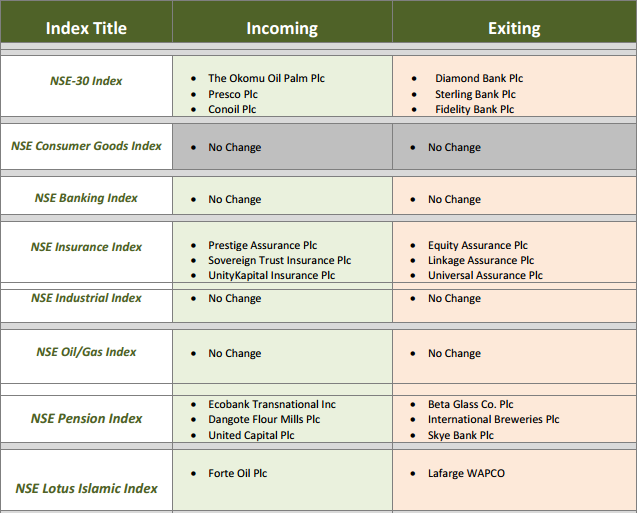The Nigerian Stock Exchange (NSE), on Friday, January 1, 2021, released its latest review of its annual full-year market index review with minor adjustments to most indices leading to the entry and exit of major companies, beginning from Monday, January 4, 2021, when the market opens.
In the NSE 30 Index, for example, conglomerate- Transnational Corporation of Nigeria Plc (Transcorp) is making an entry, while construction giant- Julius Berger Nig. Plc takes the exit door.
According to a statement by the NSE, there are no changes in the composition of the NSE Consumer Goods, Banking, Industrial Goods, Corporate Governance, and Pension indexes, while in the insurance index, Veritas Kapital Assurance Plc and African Alliance Insurance Plc are coming in, and Niger Insurance on its way out.
In the Oil & Gas Index, beginning from Monday, Eterna is coming in, and MRS leaving; while PZ Cussons is exiting the Lotus Islamic Index, with none being admitted.
According to Investdata analysis however the industry goods sector was the best for 2020, after its superlative 90.8% growth, followed by the Premium board with 64%; the insurance index recorded 50.6%; while the Mainboard pooled 49.84% respectively.
There is also no change in the composition of the Afrinvest Bank Value Index; while
Dangote Sugar Plc, FCMB Group Plc, United Capital Plc, Africa Prudential Plc, and AIICO Insurance will no longer be part of the the Afrinvest Div Yield Index, even when none is coming in.
The Meristem Growth Index seems the busiest with the entry of Access Bank, Cadbury Nigeria, Guaranty Trust Bank, and Julius Berger Nigeria, which replace BUA Cement, Glaxo Smithkline Consumer Nigeria, Okomu Oil Palm, and Wema Bank until the next review.
In the Meristem Value Index, it is Dangote Sugar Refinery, and Total Nigeria coming in, as Cadbury Nigeria, Dangote Cement, Fidelity Bank, and UACN Property Development Company exit.
The indices, the statement explained, “were developed to allow investors follow market movements and properly manage investment portfolios. Designed using the market capitalization methodology, the indices are rebalanced on a semi-annual basis on the first business day in January and in July.”
Publication of the indices began with the NSE-30 in February 2009 with values available from January 1, 2007, followed on July 1, 2008, with the development of five sectoral indices with a base value of 1,000 points.
The sectoral indices, which comprised the top 15 most capitalized and liquid companies in the Insurance and Consumer Goods sectors; the top 10 most capitalized and liquid companies in the Banking and Industrial Goods sector; and the top seven most capitalized and liquid companies in the Oil & Gas sector, were designed to provide investable benchmarks to capture the performance of specific sectors.
In July 2012, the Nigerian bourse launched The NSE Lotus Islamic Index (NSE LII), consisting of companies whose business practices conform with Shari’ah Investment Principles. The aim was to increase the breadth of the market and creating an important benchmark for investments as the alternative ethical and noninterest investment space widened.
Companies that appear on the Islamic Index have been thoroughly screened by Lotus Capital Halal Investment, in accordance with a methodology approved by an internationally recognized Shari’ah Advisory Board comprising of renowned Islamic scholars, the statement added.







